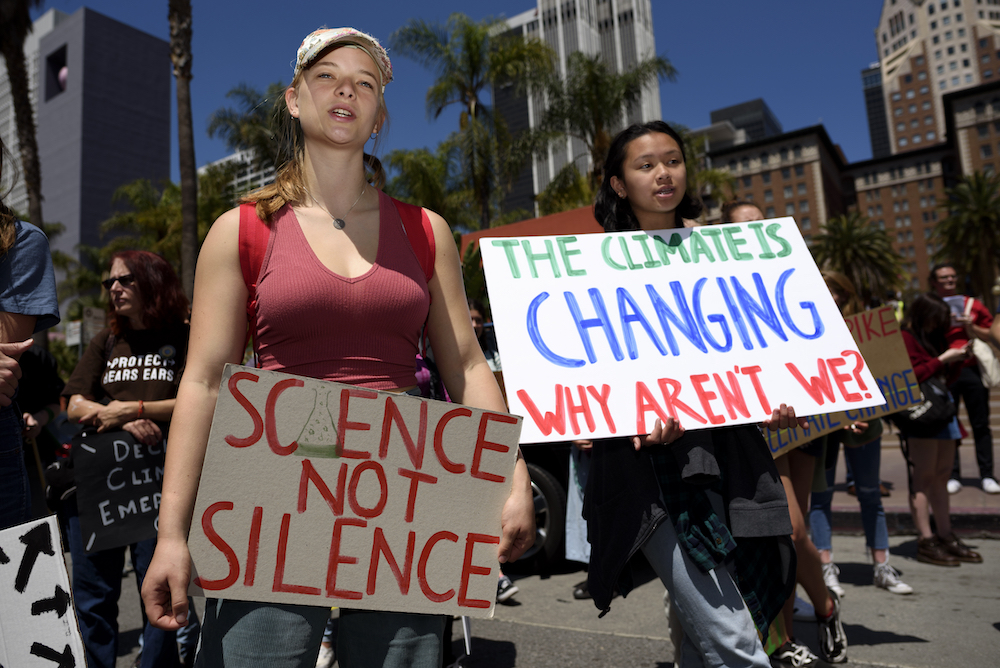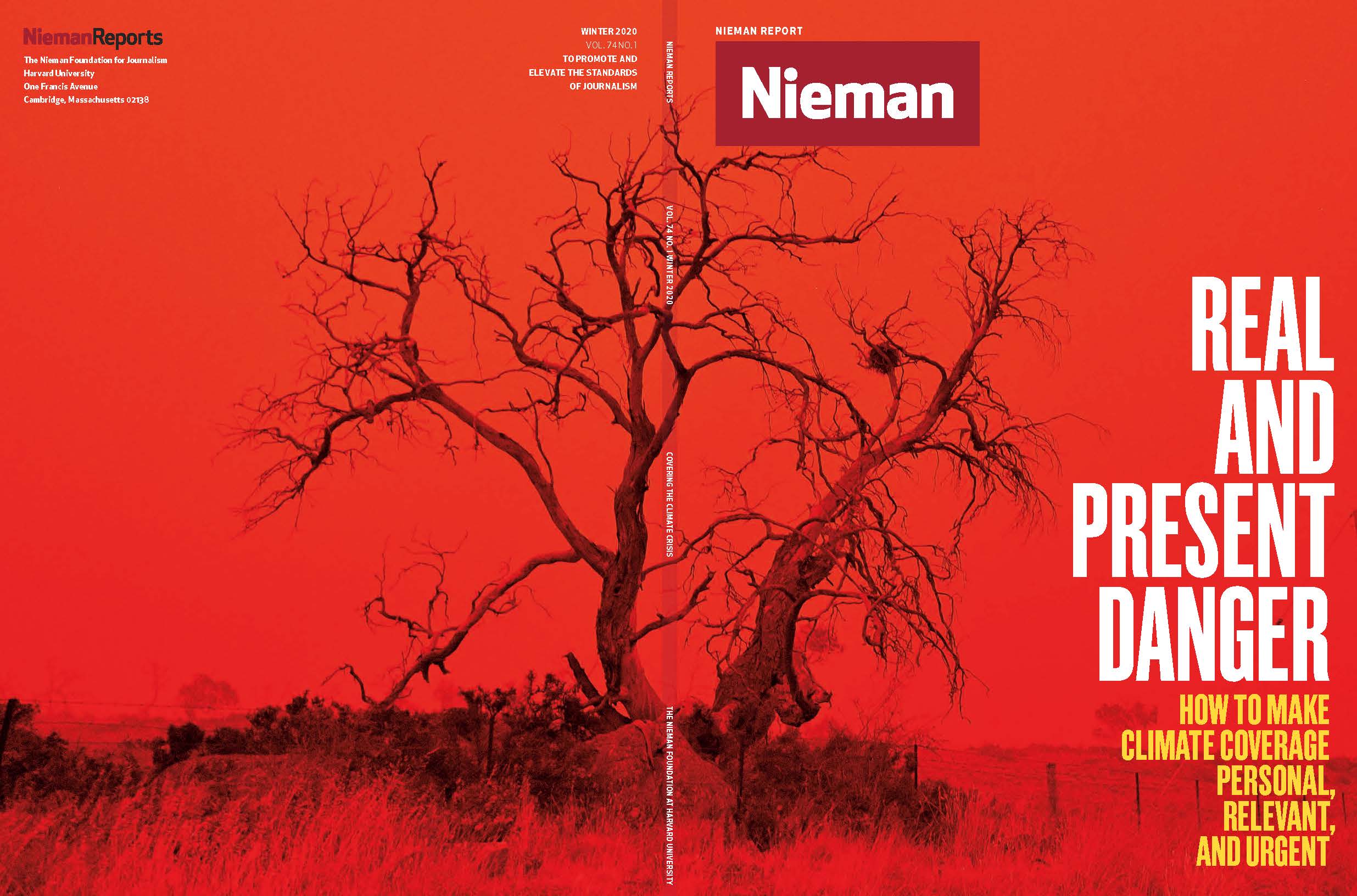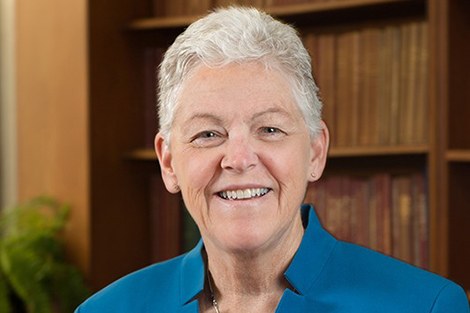
Student protesters at a climate change demonstration in Los Angeles, California in May 2019
Even when news was breaking about the impeachment inquiry into President Trump, climate change was generating 18 million interactions on social media—more than guns, immigration, and the economy. So, what made the last two weeks of September unique? Kids. Axios reported it was the most coverage on climate by far this year. It showed that when covering climate change, stories about young people demanding action resonated more than politicians and the latest scientific study.
Here’s why: scientists have been climate’s spokespeople for decades and they don’t know how to communicate in language that people can understand. They’re not all Bill Nye the Science Guy. And coverage of a politician’s “belief” in climate change doesn’t tell the story. Climate change isn’t a belief system, it’s science. But for 40 years, the fossil fuel industry paid good money to fund confusion, cast doubt on the science, skew the facts, and control the narrative. This unholy campaign has created a conservative vs. liberal divide and effectively has shifted attention away from the core climate issue that matters most—our kids’ safety, health, and future. This climate crusade must give way in the face of our climate crisis.
It’s time to tell the facts in ways that people can understand and make climate change relevant, personal, and actionable. We can’t wait any longer, it’s time to step up our act. While the Covering Climate Now initiative has been an incredible force to spark more coverage of the climate crisis, a weeklong special just doesn’t cut it. Climate is part of our everyday life and must be part of every story.
As a media outsider, I am not trying to be critical. I am a longtime government employee; I can hardly cast the first stone when it comes to communication of any kind. I just want to remind you what a crucial role you play in helping all of us face facts, make them personal and digestible so we can see that change is needed and there is a way forward. Then maybe, just maybe we will muster the personal and collective courage to act. So, here are my suggestions on how to frame the issue, inspire action, and still get clicks:
Focus on People and Tell Stories
Rather than continuing to hit us over the head with mountains of scientific data, let’s claim success. Most people get that climate change is real and it’s really, really bad. But they see it as a problem for the planet, and not something they can do anything about. Well in the words of Cool Hand Luke, “What we’ve got here is failure to communicate.” If no one individual can do anything, how can we collectively succeed?
Let’s stop talking “planet” and start talking “people.” Let’s put a face on climate change and climate action. Let’s stop talking faraway places and future decades and start talking about here and now. Climate change is already impacting the health of our kids—not to mention what inaction might mean to their future. Show the faces of people at risk. Health matters.
And there are actions we can take—steps forward we can all embrace in our homes and our communities to improve our families’ health and safety today, without sacrifice or recriminations. These actions will get us on a road toward a more stable and livable planet. Tell the story of people taking action and others may wonder why they are sitting on the sidelines.
A recent study out of Columbia University confirms it: people don’t need to “believe” in or understand the enormous scale of climate change to act on it. They just need to understand how a project will strengthen their community and they will be all over it.
Talk about Solutions and Build Hope
Scaring people isn’t fun, fair, or as it turns out, productive. Americans get overwhelmed by too much negative information. Scary climate scenarios cause apathy. People stick their heads in the sand, especially when they feel like it’s too big to fix. So, when writing about climate impacts, it’s best to cut that lengthy list of challenges down to a few bite-sized pieces and quickly pivot to solutions. We have climate change solutions that not only help fix the planet, they deliver enormous public health benefits. For example, clean energy and energy efficiency don’t just save the planet, they save lives by cleaning our air—preventing asthma and heart attacks, reducing cancer risk while saving money and growing jobs. And people of color and poor communities often benefit the most from these solutions! So why not do what you can to hold decision-makers accountable for all they can do.
Focus on Health and Give Healthcare Providers a Voice
A 2018 study showed that Independents and Democrats are more likely to click on climate articles with a health frame than other frames, such as environmental, economic, and moral. When you talk about the spread of Zika, Dengue Fever, West Nile virus, Lyme disease, EEE, and other threats from climate-related emerging infectious diseases, people pay attention. Climate change is the most significant public health threat of our time and perhaps the biggest opportunity we have to invest in public health. So it’s not hard to find content that is relevant to any particular audience: risks for pregnant women, heat risks for the elderly, asthma in young children, and mental health issues in the aftermath of storms, etc. The center I direct—the Center for Climate, Health, and the Global Environment at the Harvard T.H. Chan School of Public Health—has information about the different ways people’s health is impacted by climate change, especially for children, and ways that anyone, anywhere can become part of the solution.
Health professionals and public health organizations are much more trusted figures to talk about climate than elected officials. People interact with doctors and nurses intimately and rely on them for the monumental responsibility of protecting their health. They are less partisan and can transform climate change from an issue dominated by politics to one that matters to every person’s health here and now.
Information is power—use it to tell the climate change story in ways that cut through science jargon and make this challenge real, personal, and actionable. Use information that can stop people from burying their heads in the sand or waiting for politicians to act as if doing nothing is OK because whatever they do won’t save the planet. Millions of our children took to the streets a few weeks back to tell us just the opposite. It’s high time we listened. Information can make that happen.



